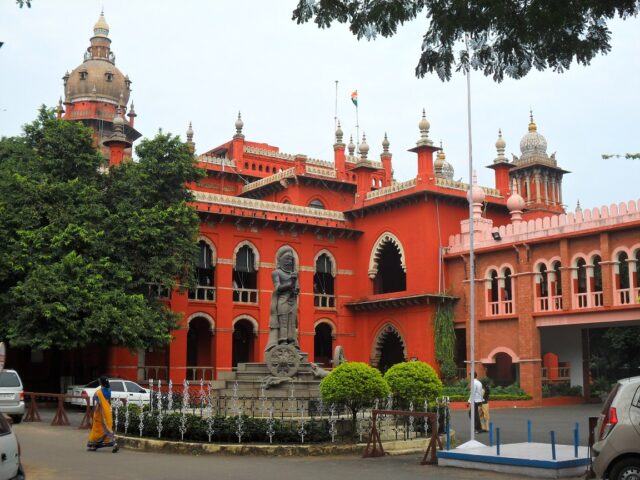
Chennai. The Madras High Court on Wednesday recommended the invocation of the Tamil Nadu Goondas Act in extreme cases of temple encroachment. Justice SM Subramaniam emphasised that all persons involved in encroachment activities, fraud etc. with respect to temple properties in Tamil Nadu should be prosecuted. While some action would fall under the HR&CE Act, in more serious cases, the Goondas Act should be invoked, the judge said.
“In extreme cases, the provisions of the Goondas Act is to be invoked by the Police based on the facts to facts basis. In such circumstances, the respondents shall not hesitate to invoke the provisions of the Goondas Act against such professional land grabbers and persons involved in encroachment and illegal activities in respect of the temple properties at large for personal and unjust gains,” the Court said.
The Judge passed the ruling while partially allowing a writ petition to quash the suspension of a trustee of the Audikesava Perumal Peyalwar Devasthanam Temple as well as enquiries initiated over alleged encroachment and mismanagement before and during his tenure.
In focus was an order issued by the HR&CE Department in August 2021, that had suspended five trustees including the petitioner, which the petitioner sought to quash. The Court was informed that the interim suspension order against the four other trustees had already been stayed by another Bench.
In view of the same, the Court ultimately lifted the interim order of suspension in respect of the petitioner but directed the authorities to continue with the enquiry.
The charge memo issued by the State Tourism, Culture, Religious Endowments Department was confirmed and the authorities were directed to “take possession of all relevant records from the subject temple for the purpose of conducting free and fair enquiry.”
Additionally, the Court also issued the following directions, in the larger public interest of protecting temple property…..
The State authorities should publish details of all the temples across Tamil Nadu widely in newspapers, calling upon encroachers or illegal occupants etc., to surrender the possession of all such properties voluntarily before the competent authorities within a stipulated period. Failing this, stern action is to be initiated against all such encroachers or illegal occupants or offenders under the relevant provisions of the HR&CE Act and Penal laws, “how so ever high they are.”
The authorities should initiate appropriate action through the Police department in cases where action under the provisions of the Goondas Act are warranted.
The authorities have to constitute a “special cell”, consisting of a team of officials with integrity and devotion to monitor the actions initiated for the retrieval of temple properties, funds, jewellery etc.
The “special cell” shall have separate telephone or mobile numbers. Such numbers must be displayed in all the temples and in the offices of the HR & CE Department, so that the general public or devotees can register their complaints.
The Director General of Police should provide all necessary protection to government officials and officials engaged by the HR & CE Department to perform such work, as and when required.
Given that the “deity” in a temple is a “minor”, the Court has to be astute and protect the interest of the idol in any litigation, the Court said. The judge added that fraudulent and illegal encroachment of temple properties is a crime against the society at large.
“Temple properties are allowed to be looted by few greedy men and by few professional criminals and land grabbers. Active or passive contribution and collusion by the officials of the HR & CE Department cannot be overruled. These lapses, negligence, dereliction of duty on the part of such public officials are also to be viewed seriously and all appropriate actions in this regard are highly warranted,” the Court opined.
“This is possible only with the passive or active collusion of the concerned authorities. Such acts of ‘fences eating the crops’ should be dealt with sternly. The Government, members or trustees of Boards/Trusts, and devotees should be vigilant to prevent any such usurpation or encroachment. It is also the duty of courts to protect and safeguard the properties of religious and charitable institutions from wrongful claims or misappropriation,” the Court said.
Input Courtesy – BarandBench & VSK BHARATH














